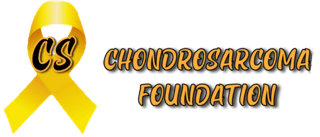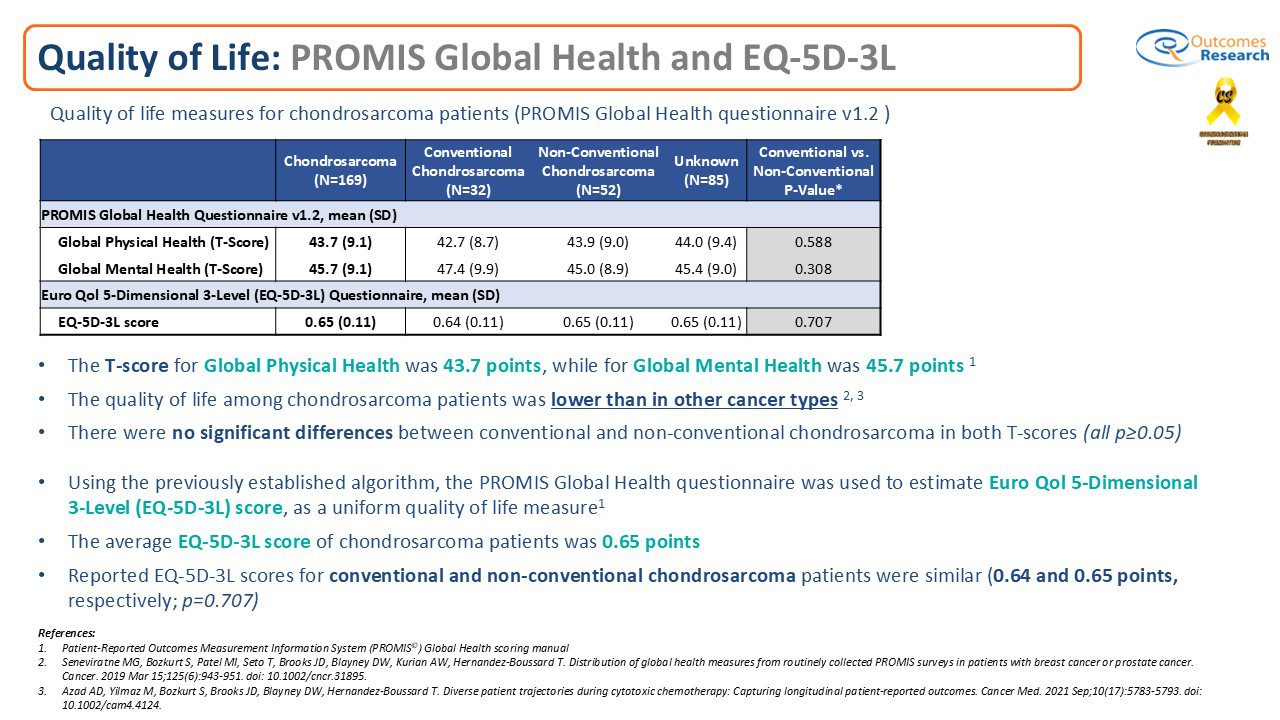Quality of Life Measures for Chondrosarcoma Patients
The Chondrosarcoma Foundation was the first foundation to be inducted into the NORD IAMRARE Patient Registry 2.0 platform. Since our launch on March 1, 2023, we have had over 230 CS Patients participate in the registry and we are reporting the results of our first full data analysis from the data collected from 169 participants who completed all the surveys in the registry. This is the first global Natural History Study addressing chondrosarcoma. For the past ten weeks we have been sharing our findings (one result at a time) to help both the sarcoma / oncology medical profession and the CS patient community understand and use these results towards developing better protocols, practices / interventions as well as building better research and clinical trials.
For chondrosarcoma patients, caregivers and families, we want them to be aware of their treatment options as well as the reported effectiveness of these options. The Patient Registry consists of data collected as self-reports from fellow chondrosarcoma patients and caregivers. We are grateful to all who have shared their stories and those who choose to participate in the registry and we encourage patients diagnosed with chondrosarcoma to share their journey and help us create an aggregate database of results to help navigate research, clinical trials and medical practice.
We are learning a lot from our first analysis. We have looked at the need for CS patients to fully understand their chondrosarcoma sub-type, address misdiagnosis, recurrence, metastasis, and examine the outcomes of surgery, radiation, traditional chemotherapy and immunotherapy. If you have not seen our earlier posts, we invite you to go to our web site: https://csfshayna.org/cs-foundation-blog/
This week we look at the results of the PROMIS® Scales (Patient-Reported Outcomes Measurement Information System). It is a validated instrument that was included in the registry to evaluate and monitor chondrosarcoma patients’ physical, mental, and social health for adults and children. A PRO (patient-reported outcome) is defined as any information on the status of a patient’s health obtained directly from patients, without modification by clinicians or other health care professionals.
The full 10-item PROMIS Scale v1.2 – Global Health measure was included as a survey administered to patients or caregivers providing answers for survivors of chondrosarcoma. The survey produced two T-scores: PROMIS Global Mental Health and PROMIS Global Physical Health. T-scores range from 39 -81 (lower numbers indicate increased likelihood of anxiety, stress, depression). A score of 50 is the average for the general population. For example, persons with a T-score of 50 are most likely to respond “Never” to the item, “I felt worthless.” Persons with a T-score of 62 are most likely to respond “Sometimes.”
In addition, we used an established algorithm, from the PROMIS Global Health questionnaire to estimate Euro Qol 5-Dimensional 3-Level (EQ-5D-3L) score, as a uniform quality of life measure. The EQ-5D-3L descriptive system comprises the following five dimensions: mobility, self-care, usual activities, pain/discomfort and anxiety/depression. Each dimension has 3 levels: no problems, some problems, and extreme problems. EQ-5D-5L index scores range from 0 to 100, where 100 is the best possible health state.
Results:
• The T-score for Global Physical Health was 43.7 points, while for Global Mental Health was 45.7 points 1
• There were no significant differences between conventional and non-conventional chondrosarcoma in both T-scores (all p≥0.05)
• The quality of life among chondrosarcoma patients was lower than in other cancer types 2, 3
• Using the previously established algorithm, the PROMIS Global Health questionnaire was used to estimate Euro Qol 5-Dimensional 3-Level (EQ-5D-3L) score, as a uniform quality of life measure1
• The average EQ-5D-3L score of chondrosarcoma patients was 0.65 points
• Reported EQ-5D-3L scores for conventional and non-conventional chondrosarcoma patients were similar (0.64 and 0.65 points, respectively; p=0.707).
Conclusion:
The quality of life of chondrosarcoma patients assessed via PROMIS Global Health Questionnaire was lower than in other cancer types. The average EQ-5D-3L score of chondrosarcoma patients was 0.65 points and was similar between conventional and non-conventional cohorts. There is a need for treatments that will improve chondrosarcoma patients’ quality of life, reduce anxiety, stress, depression and improve overall mental health.
References:
1. Patient-Reported Outcomes Measurement Information System (PROMIS©) Global Health scoring manual
2. Seneviratne MG, Bozkurt S, Patel MI, Seto T, Brooks JD, Blayney DW, Kurian AW, Hernandez-Boussard T. Distribution of global health measures from routinely collected PROMIS surveys in patients with breast cancer or prostate cancer. Cancer. 2019 Mar 15;125(6):943-951. doi: 10.1002/cncr.31895.
3. Azad AD, Yilmaz M, Bozkurt S, Brooks JD, Blayney DW, Hernandez-Boussard T. Diverse patient trajectories during cytotoxic chemotherapy: Capturing longitudinal patient-reported outcomes. Cancer Med. 2021 Sep;10(17):5783-5793. doi: 10.1002/cam4.4124.
Your participation is essential.
Be A Part of the Chondrosarcoma Patient Registry.
To Register: https://chondrosarcoma.iamrare.org/
It is not too late to sign up to participate in the Chondrosarcoma Patient Registry. The register is open at any time for CS Patients or Caregivers to go on-line and complete 9 surveys which will take less than an hour to complete. We need you to share your journey and help progress research in chondrosarcoma.
The Chondrosarcoma Patient Registry creates a platform for patients around the world to strengthen their voices and share information about this rare bone cancer. This global resource will provide data for researchers to use to advance drug development and treatment options and help improve patient care. The patient information that the registry collects will help give direction to scientists on areas in which to focus their research efforts, and to hopefully allow clinicians to see trends in patient responses to treatment for chondrosarcoma. The hope for the future is to illuminate treatments that have had some success that may become the standard of care for this rare bone cancer.

